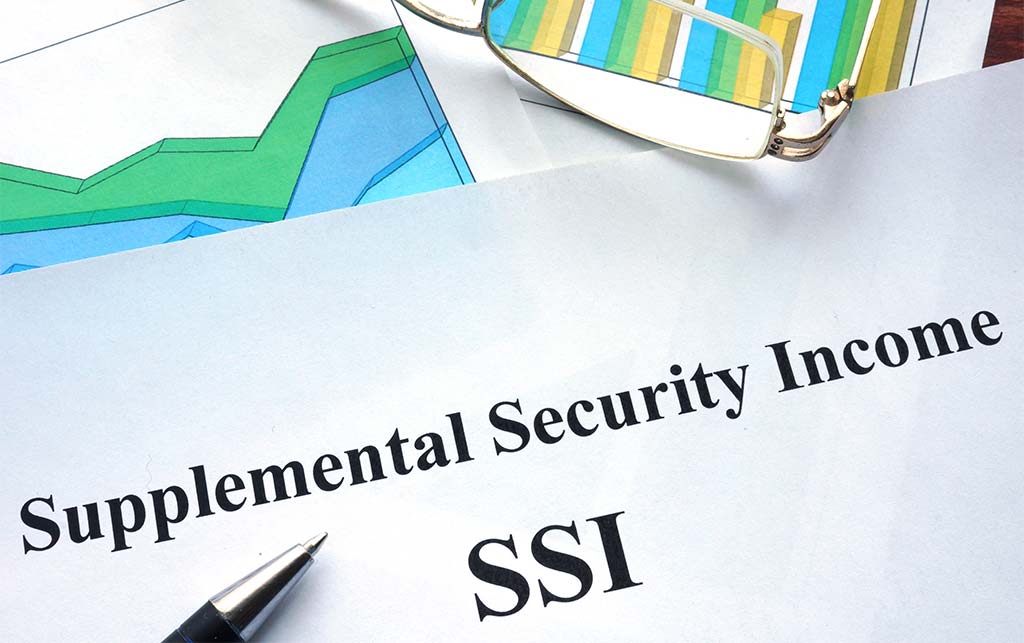What Is Supplemental Security Income (SSI)?
Those who are unable to work through disability or because they care for someone who is disabled have a few options to seek financial assistance. Obviously there is Social Security Disability Insurance (SSDI) but this is difficult to qualify for and receive.
A much easier program to be accepted for might be Supplemental Security Income. In this post we will take a closer look at this program to help you find out if you qualify and what help you can receive.
What Is Supplemental Security Income (SSI)?
The Supplemental Security Income program provides cash payments to disabled adults, disabled children and seniors over 65 years old. It is a means-tested program meaning that eligibility is dependent on the applicant's income.
This program is open to citizens or nationals of the United States and unlike SSDI you do not need to have a history of paying Social Security taxes. This is because individuals who apply may never have worked due to their disabilities or some other reason.

This was a system that was created to replace federal-state adult assistance programs. These programs served the same purpose but were state specific. As these original state programs were inconsistent in their eligibility requirements they received a great deal of criticism.
History of the SSI
Until 1972 each state had their own versions of Aid for the Blind, Aid to the Permanently Disabled and Aid to the Elderly programs. They tended to be separate programs and their eligibility requirements would vary state to state.
These federally funded programs were created as part of the 1935 Social Security Act signed into law by Franklin D. Roosevelt. It was during the Richard Nixon administration that it was decided these individual state programs should be federalized.
On October 30th 1972 Nixon signed an amendment to the Social Security system creating this new federal branch of the Social Security Administration (SSA), the Supplemental Security Income program. Its creation was intended to eliminate the differences between each state's stand alone programs.

It took some time to change the new system but finally in January 1974 the SSI program launched under the leadership of the SSA. As the SSA had already been administering disability and retirement programs for decades they were the obvious choice.
Maximum benefits through the Supplemental Security Income program in 2020 gave individuals $783 a month. This was already below the $1,084 per month federal poverty limit. It was also equal to the amount being made by retirees in the Social Security pension program.
Each year congress decides on any increases to the program based on cost of living adjustments. As it has always matched the same levels of Social Security pensions SSI will always pay out the same amounts and receive the same increases.
With the monthly payment perpetually set to be below the federal poverty limit those reliant on the program are officially living in poverty. Payments are also adjusted to reflect any income you do have so the monthly payment may be lower for certain individuals.
Who Is Eligible for Supplemental Security Income?
The eligibility requirements are less stringent than Social Security Disability Insurance so they tend to be easier to meet for those who legitimately need the assistance. There are, however, a few important requirements.
- Must be 65+, blind or disabled
- Must be a legal resident of the fifty states, District of Columbia or Northern Mariana Islands
- Children of military parents assigned overseas and certain students living abroad may also qualify
- Household income must be below the federal poverty limit
In order to qualify based on age documentation must be supplied to prove the individual is over 65 years old. Applying on grounds of disability the individual must supply proof that they qualify based on the Social Security Administration definition.
Disability decisions are made by state specific Disability Determination Services (DDS). They are contracted by the federal government so they must follow the federally determined guidelines to confirm the level of disability.
Some cases may be denied at this initial stage but they can be appealed in the courts. Generally speaking the SSI is more flexible and less likely to deny applications than the SSDI. The SSDI frequently denies the initial application and that process can take up to two years and likely require a disability lawyer.
A disabled individual who qualifies for SSDI based on a limited work history prior to the disability may also receive SSI if their income is still below the federal poverty limit.
Income and Resources
Those applying for SSI need to prove that they actually need this supplemental income so they must fall below certain financial parameters. This amount can vary by state due to general cost of living and individual living conditions. This is something you will have to research for your specific state and determine based on the program's guidelines.
It is not just income that has a bearing on eligibility but savings and assets too. Referred to as resources the limit for an individual is $2,000 increasing to $3,000 for a couple. A single parent household is permitted $4,000 in resources while a two parent household can have $5,000.
The only financial resources that are not considered are those that are non-liquid. This means that they could not be reasonably sold within 20 working days.
Free Phone Service With SSI
Those who qualify for Supplemental Security Income have already met the income requirements to apply for the Lifeline program. This program was started by the Federal Communication Commission (FCC) in 1984 during the Ronald Reagan administration.
It was created to allow low income families to get discount telephone lines. Since 2005 with the rise in the use of cell phones Lifeline branched out into offering cell phone service to low income individuals. Today a free basic smartphone and a basic phone line may be available to SSI beneficiaries.

The options of the phone service are limited to small local providers although if no participating company covers your region you might still get a discount with a major cell phone provider.
Those who qualify must have an income under or within 135% of the federal poverty limit. The table below outlines these limits for 2022.
These poverty limits are also considered in the application for SSI but are paired with other financial and income based information as well.
Applying for Supplemental Security Income Benefits
There are a few ways to apply for Supplemental Security Income benefits so you have some options:
Applying Online
We live in a very online world so obviously the easiest way to apply would definitely be online. This is done by visiting www.SSA.gov and filling out the SSI application form. Doing it this way also gives you the ability to track the status of your application through the same website.
Applying Over the Phone
If you feel you need to talk to someone and or you don’t have access to a laptop with internet capabilities then applying over the phone might be a good option.
- Phone number: 1-800-772-1213
- Deaf or hard of hearing: 1-800-325-0778
Calling the above numbers will allow you to make an appointment to talk with a representative who will walk you through the application process over the phone.
Applying in Person
This has been harder to do recently due to the pandemic which for a long time meant Social Security offices were closed. That has been changing so now you can get appointments and sometimes go in person without one to make your application.
In person may not be possible depending on your disability and mobility ability but if you can go in and would rather do it this way then it is an option.
Someone May Apply for You
There may be some people who for various reasons can not apply themselves. It is therefore permitted to have a representative that you trust who can apply on your behalf. Parents for example often apply on behalf of their disabled children.
What Documents Do You Need?
As with all things government you will need to supply documents to support your claim for SSI benefits. You will first need to supply your Social Security card or number. Next you will have to prove your age so this could be done with a birth certificate.
As this program exists for citizens of the United States you must supply proof of citizenship such as a U.S. passport or naturalization paperwork if you were not born a citizen. Once your residency and identification has been verified next will come income.

You will need to supply documentation to verify your income such as pay stubs, bank accounts etc. Resources are also considered so the titles and deeds to any property such as homes or cars need to be submitted as well.
Finally you will need to provide proof of your disability if your claim is based on that. This will require medical records and forms filled out by your primary doctor. You may be asked for additional documents throughout the process as the Social Security Administration reaches a final decision.
What If I Get Denied?
The Supplemental Security Income program seeks to make sure only eligible individuals receive benefits so they can be very stringent on rules. They are not as strict as Social Security Disability Insurance who tend to initially deny all applicants but they do frequently refuse initial applications.
If you are denied you have 60 days to file an official appeal and you can do this online. If you do not appeal within the 60 days the appeal will be dismissed and you may have to start the process over again.
Should the appeal fail and you still feel you are eligible you can request a hearing in front of a judge. At this point you may want to enlist the help of a disability lawyer. This will give you the chance to submit documents and expert witness testimony in front of a judge.
This request for a court date must also be filed within 60 days of the second refusal. A next step might be the Social Security Administration Appeals Council or finally the Federal courts. However it is rare to have to go all the way to federal courts but it can happen.
It may be frustrating to get denied but if you persevere you have a chance of winning an appeal in your case. Try and make sure you have all your documents in order and do not miss deadlines when it comes to appeals.
The SSI can be strict and although they are an assistance program they will always come from a standpoint that people may be lying. Try not to take this personally, it is bureaucracy at its worst. Just do not lose heart and fight for what you are eligible for.
Conclusion
The Supplemental Security Income program helps seniors and individuals with disabilities to develop a stream of income when they themselves are unable to earn. Those eligible for these benefits may have a disability so severe that they will never be able to earn their own income.
Unlike the Social Security Disability Insurance program eligibility is not dependent on past earnings and your tax contributions into the SSA. It helps you meet the basic needs of life and can be part of several benefits to which you are eligible.
Based on low income you may also be eligible for food stamps, Medicaid, free cell phone service and other government assistance. The maximum monthly payment falls below the federal poverty limit so will likely need to be boosted with other eligible programs if available.
Cite This Resource
Use the tool below to generate a reference for this page in common citation styles.
<a href="https://ssalocator.com/blog/what-is-supplemental-security-income-ssi.html"> What Is Supplemental Security Income (SSI)?</a>
" What Is Supplemental Security Income (SSI)?." SSA Locator. Accessed January 6, 2026. https://ssalocator.com/blog/what-is-supplemental-security-income-ssi.html.
" What Is Supplemental Security Income (SSI)?." SSA Locator, https://ssalocator.com/blog/what-is-supplemental-security-income-ssi.html. Accessed 6 January, 2026.
What Is Supplemental Security Income (SSI)?. SSA Locator. Retrieved from https://ssalocator.com/blog/what-is-supplemental-security-income-ssi.html.